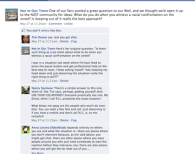Oregon has just made it easier to report hate crimes--do it online.
That's what the Department of Justice came up with after a meeting of the LGBT community in Portland, called in response to gay-bashings in the city.
Sean Riddell (pictured above, on right), chief counsel for the criminal justice division of Oregon’s Department of Justice, was at the meeting, and was “struck by the number of people who said they’d been the victim of a hate crime and didn’t report it,” says Tony Green, Riddell’s colleague and DOJ spokesman.
Why don't people report hate crimes? Fear of retribution; embarrassment; maybe it's too hard to walk into a police station and fill out the forms. There are a lot of reasons; and that concerned the state's attorney general.
Blog

June 21, 2010 - 5:44pm
Here's another way you can stay connected with the latest Not In Our Town updates and videos: the NIOT Widget.
Click the "Get Widget" tab on the bottom of the widget below, and you'll be able to embed the widget on your website, iGoogle homepage, Wordpress blog, Facebook page, Twitter profile, and more.
Want to find out more about widgets? Check out this post from the Widgetbox knowledge base.
//-->

June 15, 2010 - 3:29pm
You're walking down the street, and witness an act of racism. How do you respond?

June 8, 2010 - 4:33pm
What can you do when a notorious hate group targets a wide array of institutions in your community, each of which has its own leadership, values, and organizational methods?
That's the situation that faced Charleston and Wheeling, West Virginia in March, when Fred Phelps' Westboro hate group announced it would picket Catholic and Jewish institutions in the two towns, a local university, and a mine where more than a dozen miners had recently lost their lives.
What they came up with was "West Virginia: No Place for Hate," a multi-pronged action campaign that was featured on NIOT.org last month.

June 2, 2010 - 11:49am
Last week, the Not In Our Town film crew traveled to Suffolk County, NY to continue our coverage of community response to the hate crime killing of Marcelo Lucero, an Ecuadorean immigrant who was attacked by seven local high school students and stabbed to death by one of them on November 8, 2008. The story of young people roaming the streets of a town looking for "Mexicans" to beat up shocked the nation, and the case has become an alarming manifestation of the increasing animosity toward immigrants in this country.
Our story looks at the effects of the hate crime attacks on Marcelo Lucero and other immigrants in Suffolk County, and on how a diverse group of people in this community are trying to repair the divisions in the aftermath of this crime.
